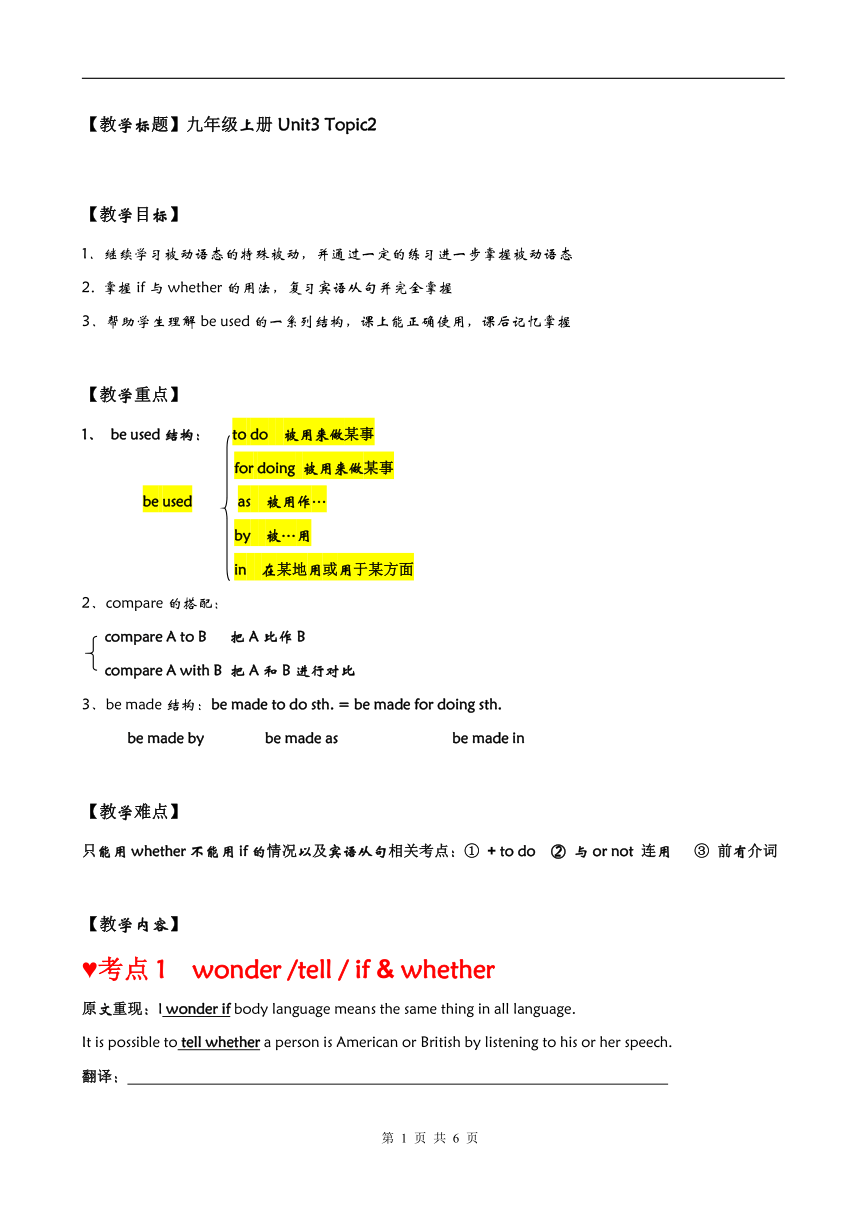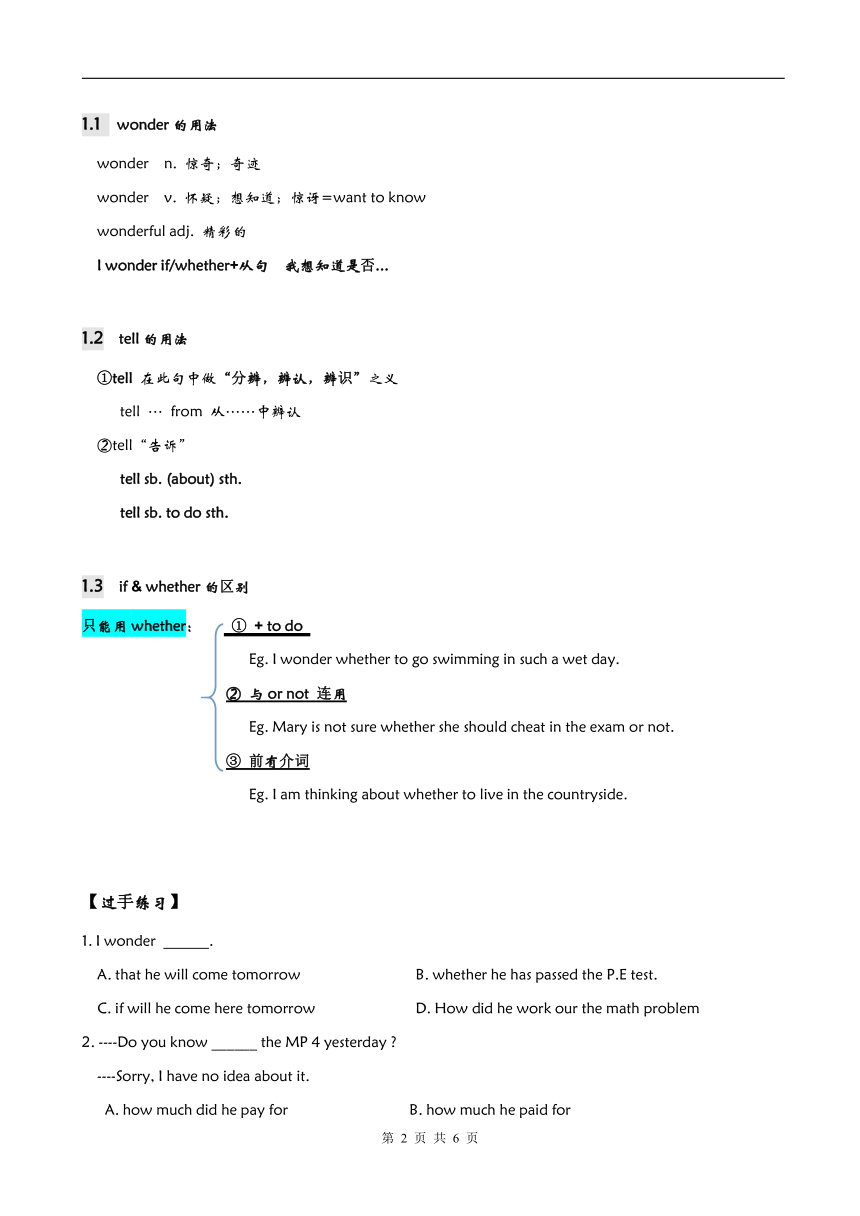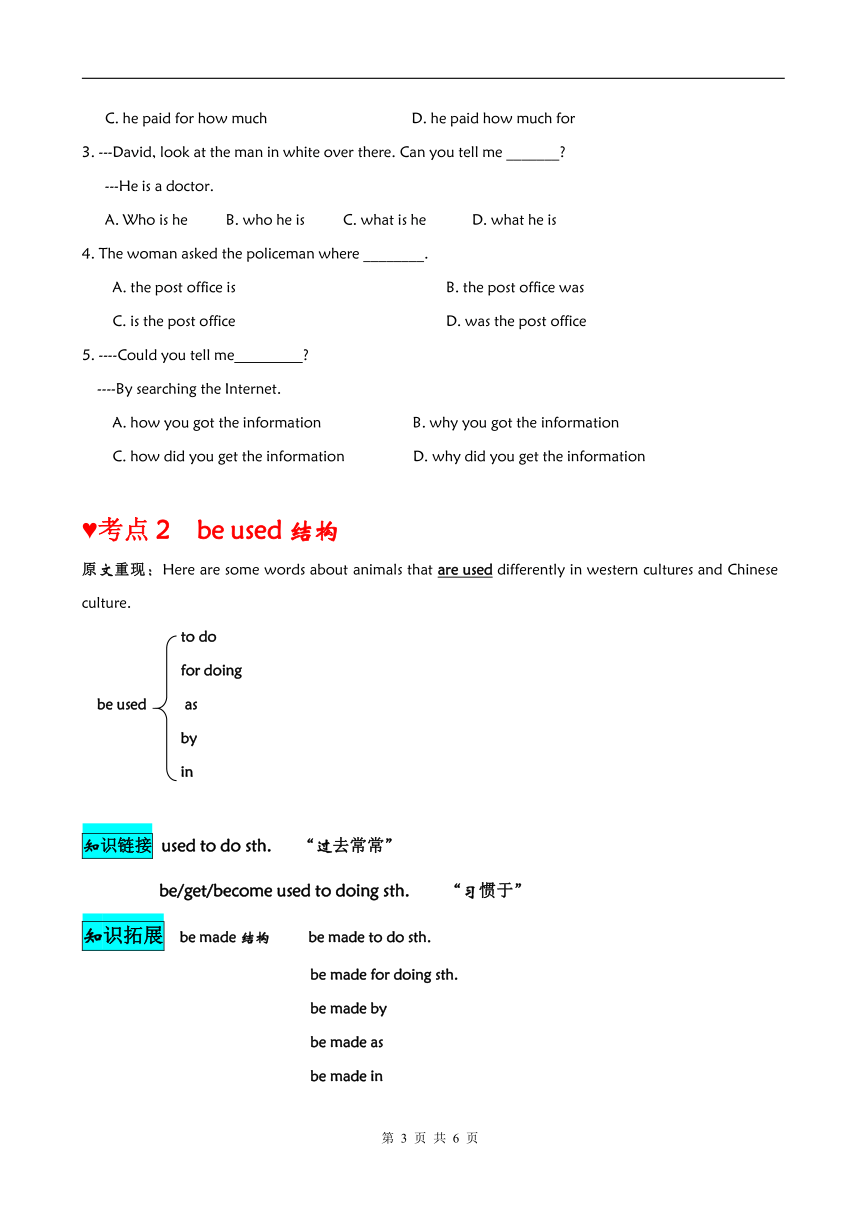Unit3 Topic2 Some things usually have different meanings in different cultures 学案(知识点复习及练习)(无答案)
文档属性
| 名称 | Unit3 Topic2 Some things usually have different meanings in different cultures 学案(知识点复习及练习)(无答案) |

|
|
| 格式 | doc | ||
| 文件大小 | 158.0KB | ||
| 资源类型 | 教案 | ||
| 版本资源 | 仁爱科普版 | ||
| 科目 | 英语 | ||
| 更新时间 | 2023-01-03 11:24:05 | ||
图片预览



文档简介
【教学标题】九年级上册Unit3 Topic2
【教学目标】
1.继续学习被动语态的特殊被动,并通过一定的练习进一步掌握被动语态
2. 掌握if与whether的用法,复习宾语从句并完全掌握
3.帮助学生理解be used的一系列结构,课上能正确使用,课后记忆掌握
【教学重点】
1、 be used结构: to do 被用来做某事
for doing 被用来做某事
be used as 被用作…
by 被…用
in 在某地用或用于某方面
2、compare的搭配:
compare A to B 把A比作B
compare A with B 把A和B进行对比
3、be made结构:be made to do sth. = be made for doing sth.
be made by be made as be made in
【教学难点】
只能用whether不能用if的情况以及宾语从句相关考点:① + to do ② 与or not 连用 ③ 前有介词
【教学内容】
考点1 wonder /tell / if & whether
原文重现:I wonder if body language means the same thing in all language.
It is possible to tell whether a person is American or British by listening to his or her speech.
翻译:
1.1 wonder的用法
wonder n. 惊奇;奇迹
wonder v. 怀疑;想知道;惊讶=want to know
wonderful adj. 精彩的
I wonder if/whether+从句 我想知道是否...
1.2 tell的用法
①tell 在此句中做“分辨,辨认,辨识”之义
tell … from 从……中辨认
②tell“告诉”
tell sb. (about) sth.
tell sb. to do sth.
1.3 if & whether的区别
只能用whether: ① + to do
Eg. I wonder whether to go swimming in such a wet day.
② 与or not 连用
Eg. Mary is not sure whether she should cheat in the exam or not.
③ 前有介词
Eg. I am thinking about whether to live in the countryside.
【过手练习】
1. I wonder .
A. that he will come tomorrow B. whether he has passed the P.E test.
C. if will he come here tomorrow D. How did he work our the math problem
2. ----Do you know ______ the MP 4 yesterday
----Sorry, I have no idea about it.
A. how much did he pay for B. how much he paid for
C. he paid for how much D. he paid how much for
3. ---David, look at the man in white over there. Can you tell me _______
---He is a doctor.
A. Who is he B. who he is C. what is he D. what he is
4. The woman asked the policeman where ________.
A. the post office is B. the post office was
C. is the post office D. was the post office
5. ----Could you tell me
----By searching the Internet.
A. how you got the information B. why you got the information
C. how did you get the information D. why did you get the information
考点2 be used结构
原文重现:Here are some words about animals that are used differently in western cultures and Chinese culture.
to do
for doing
be used as
by
in
知识链接 used to do sth. “过去常常”
be/get/become used to doing sth. “习惯于”
知识拓展 be made结构 be made to do sth.
be made for doing sth.
be made by
be made as
be made in
【过手练习】
1. 那把刀是用来切苹果的。
The knife ____________ ____________ ____________ cut apples.
2. 木材可以用来造纸。
Wood can ____________ ____________ ____________ making paper.
考点3 compare / symbol / attention
原文重现:The ancient emperors compared themselves to dragons.
The rose is regarded as a symbol of love in both China and some western countries.
When we pay attention to the cultural meanings of words, we will understand them better.
3.1 compare的搭配
compare A to B 把A比作B
compare A with B 把A和B进行对比
3.2 symbol
a symbol of …… ……的象征/标志
stand for…… 象征……
3.3 pay attention to doing sth. 注意……
【过手练习】
1. 龙被视为是中华民族的象征。
The dragon is ____________ as a symbol of the Chinese nation.
2. 别拿自己和别人比,每个人都有自己的喜怒哀乐。
Don’t ____________ yourself ____________ others. Everyone has his own happiness or sadness.
3. 你要注意街上不遵守交通规则的车辆。
You should ____________ ____________ ____________ the cars which disobey the traffic rules.
4. 当在国外的时候,我们代表的是自己的国家。
We ____________ ____________ our country when we are abroad.
5. 她被比作一朵漂亮的花,所以她觉得很开心。
She ____________ ____________ ____________ a beautiful flower so she felt very happy.
6. 五星红旗是中国人民的一个象征。
The five-star red flag is ____________ ____________ ____________ Chinese people.
7. 你要注意拼写。
You should ____________ ____________ ____________ spelling.
【课后练习】(建议用时:20分钟;总分10分)
一、(每题2分,共10分)(勾画出答案,将答案出翻译成中文)
“How are you ” is a nice question. It’s a friendly way that people in the USA greet each other. But “How are you ” is also a very unusual question. It’s a question that often doesn’t need an answer. The person who asks “How are you ” hopes to hear the answer “Fine”, even if the person’s friend isn’t fine. The reason is that “How are you ” isn’t really a question and “Fine” isn’t really an answer. They are simply other ways of saying “Hello” or “Hi”.
Sometimes, people don’t say exactly what they mean. For example, when someone asks “Do you agree ”, the other person might think, “No, I disagree. I think you’re wrong...” But it isn’t very polite to disagree so strongly, so the other person might say “I’m not sure.” It’s a nicer way to say that you don’t agree with someone.
People don’t say exactly what they are thinking when they want to finish talking with other people. For example, many talks over the phone finish when one person says “I’ve to go now.” Often, the person who wants to hang up gives an excuse: “Someone’s at the door.” “Something is burning on the stove.” The excuses might be real, or not. Perhaps the person who wants to hang up simply doesn’t want to talk any more, but it isn’t polite to say that. The excuse is more polite, and it doesn’t hurt the other person.
Whether they are greeting each other, talking about an idea, or finishing a talk, people don’t say exactly what they are thinking. It’s an important way that people try to be nice to each other, and it’s part of the game of language.
根据短文内容,选择正确答案。
( )1. When a person in America asks“How are you ”, he or she wants to hear“ ________ ”
A. How are you B. Hello. C. I don't know. D. Fine.
( )2. When a person disagrees with someone, it is polite to say “_________ ”
A. You are wrong. I disagree. B. I'm not sure.
C. I’m sure I disagree. D. I don’t agree with you.
( )3. A polite way to finish a talk is to say “__________”
A. You have to go now. B. I want to hang up.
C. I have to go now. D. I don't want to talk any more.
( )4. When a person says “I’ve got to go now. Someone’s at the door.”, the person may be_______.
A. giving an excuse B. hurting someone’s feelings
C. talking to a person at the door D. going to another place
( )5. The rule of the game of language is probably____________ .
A.“Always say what you mean.” B.“Don’t disagree with people.”
C.“Never say exactly what you’re thinking.” D.“Be polite.”
1
【教学目标】
1.继续学习被动语态的特殊被动,并通过一定的练习进一步掌握被动语态
2. 掌握if与whether的用法,复习宾语从句并完全掌握
3.帮助学生理解be used的一系列结构,课上能正确使用,课后记忆掌握
【教学重点】
1、 be used结构: to do 被用来做某事
for doing 被用来做某事
be used as 被用作…
by 被…用
in 在某地用或用于某方面
2、compare的搭配:
compare A to B 把A比作B
compare A with B 把A和B进行对比
3、be made结构:be made to do sth. = be made for doing sth.
be made by be made as be made in
【教学难点】
只能用whether不能用if的情况以及宾语从句相关考点:① + to do ② 与or not 连用 ③ 前有介词
【教学内容】
考点1 wonder /tell / if & whether
原文重现:I wonder if body language means the same thing in all language.
It is possible to tell whether a person is American or British by listening to his or her speech.
翻译:
1.1 wonder的用法
wonder n. 惊奇;奇迹
wonder v. 怀疑;想知道;惊讶=want to know
wonderful adj. 精彩的
I wonder if/whether+从句 我想知道是否...
1.2 tell的用法
①tell 在此句中做“分辨,辨认,辨识”之义
tell … from 从……中辨认
②tell“告诉”
tell sb. (about) sth.
tell sb. to do sth.
1.3 if & whether的区别
只能用whether: ① + to do
Eg. I wonder whether to go swimming in such a wet day.
② 与or not 连用
Eg. Mary is not sure whether she should cheat in the exam or not.
③ 前有介词
Eg. I am thinking about whether to live in the countryside.
【过手练习】
1. I wonder .
A. that he will come tomorrow B. whether he has passed the P.E test.
C. if will he come here tomorrow D. How did he work our the math problem
2. ----Do you know ______ the MP 4 yesterday
----Sorry, I have no idea about it.
A. how much did he pay for B. how much he paid for
C. he paid for how much D. he paid how much for
3. ---David, look at the man in white over there. Can you tell me _______
---He is a doctor.
A. Who is he B. who he is C. what is he D. what he is
4. The woman asked the policeman where ________.
A. the post office is B. the post office was
C. is the post office D. was the post office
5. ----Could you tell me
----By searching the Internet.
A. how you got the information B. why you got the information
C. how did you get the information D. why did you get the information
考点2 be used结构
原文重现:Here are some words about animals that are used differently in western cultures and Chinese culture.
to do
for doing
be used as
by
in
知识链接 used to do sth. “过去常常”
be/get/become used to doing sth. “习惯于”
知识拓展 be made结构 be made to do sth.
be made for doing sth.
be made by
be made as
be made in
【过手练习】
1. 那把刀是用来切苹果的。
The knife ____________ ____________ ____________ cut apples.
2. 木材可以用来造纸。
Wood can ____________ ____________ ____________ making paper.
考点3 compare / symbol / attention
原文重现:The ancient emperors compared themselves to dragons.
The rose is regarded as a symbol of love in both China and some western countries.
When we pay attention to the cultural meanings of words, we will understand them better.
3.1 compare的搭配
compare A to B 把A比作B
compare A with B 把A和B进行对比
3.2 symbol
a symbol of …… ……的象征/标志
stand for…… 象征……
3.3 pay attention to doing sth. 注意……
【过手练习】
1. 龙被视为是中华民族的象征。
The dragon is ____________ as a symbol of the Chinese nation.
2. 别拿自己和别人比,每个人都有自己的喜怒哀乐。
Don’t ____________ yourself ____________ others. Everyone has his own happiness or sadness.
3. 你要注意街上不遵守交通规则的车辆。
You should ____________ ____________ ____________ the cars which disobey the traffic rules.
4. 当在国外的时候,我们代表的是自己的国家。
We ____________ ____________ our country when we are abroad.
5. 她被比作一朵漂亮的花,所以她觉得很开心。
She ____________ ____________ ____________ a beautiful flower so she felt very happy.
6. 五星红旗是中国人民的一个象征。
The five-star red flag is ____________ ____________ ____________ Chinese people.
7. 你要注意拼写。
You should ____________ ____________ ____________ spelling.
【课后练习】(建议用时:20分钟;总分10分)
一、(每题2分,共10分)(勾画出答案,将答案出翻译成中文)
“How are you ” is a nice question. It’s a friendly way that people in the USA greet each other. But “How are you ” is also a very unusual question. It’s a question that often doesn’t need an answer. The person who asks “How are you ” hopes to hear the answer “Fine”, even if the person’s friend isn’t fine. The reason is that “How are you ” isn’t really a question and “Fine” isn’t really an answer. They are simply other ways of saying “Hello” or “Hi”.
Sometimes, people don’t say exactly what they mean. For example, when someone asks “Do you agree ”, the other person might think, “No, I disagree. I think you’re wrong...” But it isn’t very polite to disagree so strongly, so the other person might say “I’m not sure.” It’s a nicer way to say that you don’t agree with someone.
People don’t say exactly what they are thinking when they want to finish talking with other people. For example, many talks over the phone finish when one person says “I’ve to go now.” Often, the person who wants to hang up gives an excuse: “Someone’s at the door.” “Something is burning on the stove.” The excuses might be real, or not. Perhaps the person who wants to hang up simply doesn’t want to talk any more, but it isn’t polite to say that. The excuse is more polite, and it doesn’t hurt the other person.
Whether they are greeting each other, talking about an idea, or finishing a talk, people don’t say exactly what they are thinking. It’s an important way that people try to be nice to each other, and it’s part of the game of language.
根据短文内容,选择正确答案。
( )1. When a person in America asks“How are you ”, he or she wants to hear“ ________ ”
A. How are you B. Hello. C. I don't know. D. Fine.
( )2. When a person disagrees with someone, it is polite to say “_________ ”
A. You are wrong. I disagree. B. I'm not sure.
C. I’m sure I disagree. D. I don’t agree with you.
( )3. A polite way to finish a talk is to say “__________”
A. You have to go now. B. I want to hang up.
C. I have to go now. D. I don't want to talk any more.
( )4. When a person says “I’ve got to go now. Someone’s at the door.”, the person may be_______.
A. giving an excuse B. hurting someone’s feelings
C. talking to a person at the door D. going to another place
( )5. The rule of the game of language is probably____________ .
A.“Always say what you mean.” B.“Don’t disagree with people.”
C.“Never say exactly what you’re thinking.” D.“Be polite.”
1
同课章节目录
- Unit 1 The Changing World
- Topic 1 Our country has developed rapidly.
- Topic 2 The population in developing countries is
- Topic 3 The world has changed for the better.
- Unit 2 Saving the earth.
- Topic 1 Pollution has causes too many problems.
- Topic 2 All these problems are very serious.
- Topic 3 What can we do to protect the environment
- Unit 3 English around the World
- Topic 1 English is widely spoken around the world.
- Topic 2 Some things usually have different meaning
- Topic 3 Could you give us some advice on how to l
- Unit 4 Amazing Science
- Topic 1 When was it invented?
- Topic 2 I'm excited about the things that will be
- Topic 3 China is the third nation that sent a pers
